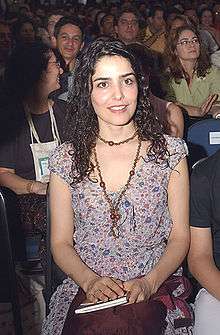O Clone
| O Clone | |
|---|---|
 | |
| Genre | Telenovela |
| Created by | Glória Perez |
| Written by | Glória Perez |
| Directed by | Jayme Monjardim |
| Starring |
Murilo Benício Giovanna Antonelli Vera Fischer Reginaldo Faria Eliane Giardini Dalton Vigh Daniela Escobar Adriana Lessa Juca de Oliveira Stênio Garcia Nívea Maria Jandira Martini Cristiana Oliveira Letícia Sabatella Neuza Borges Débora Falabella |
| Theme music composer | Sagrado Coração da Terra |
| Opening theme | "Sob o Sol" by Sagrado Coração da Terra[1] |
| Country of origin | Brazil |
| Original language(s) | Portuguese |
| No. of episodes |
221 (original run) 250 (international) |
| Production | |
| Location(s) |
Rio de Janeiro Morocco |
| Cinematography |
Jayme Monjardim Mário Márcio Bandarra Marcos Schechtmann |
| Camera setup | Multi-camera |
| Running time | 50 minutes |
| Release | |
| Original network | Rede Globo |
| Original release | 1 October 2001 – 15 June 2002 |
| Chronology | |
| Preceded by | Porto dos Milagres |
| Followed by | Esperança |
| Related shows | El clon |
O Clone (Portuguese for The Clone) is a Brazilian telenovela that ran on the Rede Globo from 1 October 2001 to 14 June 2002, airing 221 episodes.
Starring Giovanna Antonelli, Murilo Benício, Adriana Lessa, Juca de Oliveira, Eliane Giardini, Stênio Garcia, Letícia Sabatella, Antônio Calloni, Débora Falabella, Marcello Novaes, Dalton Vigh, Daniela Escobar, Reginaldo Faria and Vera Fischer.
Plot
In the early 1980s, Rio de Janeiro, Brazil; Jade (Giovanna Antonelli), a young Muslim girl is orphaned when her mother dies and has to go to Morocco where her uncle Alí lives. The problem is that Jade was living in a country with a culture very different from that of an Islamic country. Thus, once she arrives in Morocco, she must learn all concomitant new traditions and customs, adjust to her new way of living, and face all the punishments she will be exposed to because of her conflicting personality and actions that go against her religion.
Back in Rio, a well-off family, the Ferraz, go to vacation in Morocco. Twin brothers Lucas and Diogo Ferraz (Murilo Benício), along with Leônidas (Reginaldo Faria), their father, and doctor Augusto Albieri (Juca de Oliveira), friend of the family and genetic scientist, visit Alí, a friend of Albieri's. There, Lucas and Jade meet for the first time, and they fall in love at first sight. Jade, knowing it's haraam (a sin) to love Lucas, decides to forgo her religious mandates for the sake of love, which prohibit her from marrying a non-religious person. In desperation, Jade and Lucas resolve to run away to Brazil.
Meanwhile, in Rio, Diogo tragically dies in a helicopter crash. Both Lucas and Leônidas are devastated by the news and Lucas' plans of running away with Jade are subsequently ruined. Albieri, his godparent, is shattered and becomes deeply despondent. He never recovered fully from the death of his fiancée, and Diogo's death reinvigorates his distress.
In an effort to change the natural course of events, Albieri in his despair resolves to utilize Lucas' cell in order to make the first human clone. Deusa (Adriana Lessa), a low-middle class woman who has not been able to get pregnant, is subsequently inseminated with Lucas' cell, and as a result gives birth to a baby, not knowing that it is a clone. Léo is born without complications, but Albieri wants to stay close to Léo and watch him grow up. Léo gradually becomes attached to Albieri, thus making Deusa uneasy.
Several years have passed since Léo was born. Now, Jade is married to Saíd (Dalton Vigh) and she's a mother of a little child, Khadija (Carla Diaz). She lives happily with her new family and is even starting to love Saíd. However, due to Said's insecurities a new encounter with Lucas is forced upon her to test Jade's love for him, with this encounter the old passion revives, but they're not the young lovers they once were and now they have new lives and new responsibilities. Lucas, who also is married, to Maysa (Daniela Escobar) and with a daughter, Mel (Débora Falabella) doesn't know he had been cloned 20 years before. Albieri had kept this a secret from everybody's knowledge and is trying to make it so that Léo and Lucas never meet and thus find out the truth. The last thing Albieri knew from Léo is that he and Deusa went to the north of Brazil, but with the return of both, Léo has become a young, handsome man, and the living image of the young Lucas whom Jade met in Morocco. The appearance of Leo in Brazil and his later travels to Morocco will change the life of all the characters forever.
Syndication
O Clone aired in Brazil comprising 221 episodes, of variable duration. However, when syndicated and sold to other countries the telenovela got the number of episodes enlarged to 250 and the duration fixed at 45 minutes. O Clone was a big hit, being aired in several countries all around the world. It was dubbed in several languages, with the Spanish version airing in the United States by Telemundo. There are also a few differences between the Brazilian soundtrack version and the syndicated one; some music was changed in order to make the people feel more identified, many Portuguese songs were changed to Hispanic American music when it aired to the Hispanics in the United States. See Soundtrack to see the list of music featured in the telenovela. Also, the Brazilian opening features the song "Sob o Sol" by Sagrado Coração da Terra, and the syndicated opening features the same video, but the music is replaced by "Maktub" by Marcus Viana.
Remake in Spanish
In January 2010, a remake in Spanish started to be recorded in Colombia. This remake is a production of Rede Globo and Telemundo and it was titled El Clon.[2]
Cast
| Actor | Character |
|---|---|
| Murilo Benício | Lucas Ferraz |
| Diogo Ferraz | |
| Edvaldo Leandro "Léo" Moura da Silva | |
| Giovanna Antonelli | Jade Rachid |
| Vera Fischer | Yvete Simas Ferraz |
| Reginaldo Faria | Leônidas Ferraz (Leãozinho) |
| Juca de Oliveira | Augusto Albieri |
| Adriana Lessa | Deusa da Silva |
| Dalton Vigh | Said Rachid |
| Daniela Escobar | Maysa Ferraz |
| Stênio Garcia | Ali El Adib |
| Eliane Giardini | Nazira Rachid |
| Letícia Sabatella | Latiffa El Adib Rachid |
| Antônio Calloni | Mohamed Rachid |
| Débora Falabella/Cynthia Falabella | Mel (Melissa Ferraz) |
| Cristiana Oliveira | Alicinha (Alice Maria Ferreira das Neves) |
| Marcello Novaes | Xande (Alexandre Cordeiro) |
| Nívea Maria | Edna Albieri |
| Jandira Martini | Zoraide |
| Solange Couto | Dona Jura Cordeiro |
| Osmar Prado | Lobato |
| Cissa Guimarães | Clarisse |
| Marcos Frota | Escobar |
| Neuza Borges | Dalva |
| Ruth de Souza | Dona Mocinha da Silva |
| Victor Fasano | Otávio Valverde (Tavinho) |
| Beth Goulart | Lidiane Valverde |
| Luciano Szafir | Zein |
| Nívea Stelmann | Ranya Rachid |
| Thiago Fragoso | Nando Escobar |
| Sthefany Brito | Samira El Adib Rachid |
| Thaís Fersoza | Telma Valverde (Telminha) |
| Sérgio Marone | Maurício Valverde (Cecéu) |
| Elizângela | Noêmia |
| Viviane Victorette | Regina da Costa (Regininha) |
| Raul Gazolla | Miro |
| Françoise Forton | Simone |
| Juliana Paes | Karla |
| Mara Manzan | Odete |
| Roberto Bonfim | Edvaldo |
| Carla Diaz | Khadija Rachid |
| Perry Salles | Mustafá Rachid |
| Sebastião Vasconcellos | Tio Abdul Rachid |
| Thiago Oliveira | Amin El Adib Rachid |
| Carolina Macieira | Sumaya Rachid |
| Totia Meireles | Laurinda Albuquerque |
| Guilherme Karan | Raposão |
| Eri Johnson | Ligeirinho |
| Myrian Rios | Anita |
| Murilo Grossi | Júlio |
| Thalma de Freitas | Carol |
| Marcelo Brou | Pitoco |
| Léa Garcia | Lola da Silva |
| Francisco Cuoco | Padre Matiolli |
| Tania Alves | Norma |
| Sílvio Guindane | Basílio |
| Christiana Kalache | Aninha |
| Maria João Bastos | Amália |
| Jayme Periard | Rogê |
| Antônio Pitanga | Tião |
| Ingra Liberato | Amina |
| Michelle Franco | Michelle |
| Milena Paula | Milena |
| Eduardo Martini | Cotia |
| Eduardo Canuto | Gasolina |
| Luá Ubacker | Duda |
| Aimée Ubacker | Aimée |
| Andressa Koetz | Soninha |
 Murilo Benício as Lucas, Diogo and the clone Léo.
Murilo Benício as Lucas, Diogo and the clone Léo. Giovanna Antonelli as Jade Rachid.
Giovanna Antonelli as Jade Rachid. Vera Fischer as Yvete.
Vera Fischer as Yvete. Adriana Lessa as Deusa.
Adriana Lessa as Deusa. Stênio Garcia as Ali.
Stênio Garcia as Ali. Daniela Escobar as Maysa.
Daniela Escobar as Maysa.- Dalton Vigh as Said.
- Marcello Novaes as Xande.
 Letícia Sabatella as Latiffa.
Letícia Sabatella as Latiffa. Marcos Frota as Escobar.
Marcos Frota as Escobar. Juliana Paes as Karla.
Juliana Paes as Karla.- Totia Meireles as Laurinda.
 Sérgio Marone as Cecéu.
Sérgio Marone as Cecéu. Victor Fasano as Tavinho.
Victor Fasano as Tavinho. Débora Falabella as Mel Ferraz.
Débora Falabella as Mel Ferraz. Thiago Fragoso as Nando.
Thiago Fragoso as Nando. Nívea Maria as Edna.
Nívea Maria as Edna. Francisco Cuoco as Padre Matiolli.
Francisco Cuoco as Padre Matiolli.
The replacement of Débora Falabella
- Cynthia Falabella is a sister of Débora Falabella (the actress who plays Mel). In earlier episodes, Débora got sick and Cynthia replaced her.
Portrayal of Muslims
While the telenovela's attention to issues of drug addiction won its creator an award, the portrayal of Arab-Muslim cultures has brought a critical response from different Arab-Muslim sources, according to a 2005 doctoral dissertation written about the program by Elizabeth Barbosa.[3]
The part of the telenovela dealing with Islamic customs and attitudes mixes traditions from diverse countries, rather than those of Morocco alone, and has been criticised for its inaccurate representation of these traditions, according to Barbosa. These criticisms include the portrayal of polygamy as commonly accepted in Morocco, women as rarely working outside the home or pursuing an advanced education, and women having only unimportant roles within the family. Critics making these judgments included sheik Abdelmalek Cherkaoui Ghazouani, the Moroccan ambassador to Brazil, who considered the high profile of these representations to merit his posting his criticisms directly on his embassy's website as part of a bulletin board.
In addition to sources from the print media, Barbosa presents several messages from online forums that she analyzed for her study.
Reception
Ratings
| Timeslot | # Eps. | Premiere | Finale | Position | TV season | Average viewership | ||
|---|---|---|---|---|---|---|---|---|
| Date | Viewers (in points) |
Date | Viewers (in points) | |||||
| 20:35 |
221 | 1 October 2001 |
47[4] | 14 June 2002 |
62[5] | #1 | 2001 - 2002 | 47[6] |
In its premiere, O Cloneregistered a viewership rating of 47 points, peaking at 53 points.[4]
Its ever lowest recorded data in terms of viewership was on the New Year's Eve of 31 December 2001.
On the episode of the first between Lucas and his clone registered 56 points and 63 points peak, with 73% audience share.[7]
In its finale, O Clone registered a viewership rating of 62 points peaking at 68 and 77% audience share.[5]
O Clone registered a mean viewership rating of 47 points.[6]
Broadscast International
| Country | Local Title | TV network(s) | Airdate | Weekly Schedule | Timeslot |
|---|---|---|---|---|---|
| | Kloni | Top Channel | 2004 - 2005 | Monday to Friday | 22:15 |
| | El Clon | Canal 13 / Magazine | 2002-2003 | Monday to Friday | 19:00 21:00 and 14:30 (Replays) |
| | Կլոն | Armenia TV | |||
| | Klon | Lider TV | 2003-2004 | ||
| | Unitel | ||||
| | TVSA | ||||
| | Клонинг | Nova Television | |||
| | O Clone | Omni Television | 2003 | Monday to Friday | 16:00 |
| |
El Clon | Canal 13 | 2002-2003 | Monday to Friday | 14:30 |
| 2015 | Monday to Friday | 16:00 | |||
| La Red | 2005-2006 | Monday to Friday | 21:00 | ||
| | El Clon | Caracol TV | |||
| | El Clon | Teletica | |||
| | El Clon | Tele Antillas | |||
| | El Clon | Ecuavisa | 2003 | Monday to Friday | 20:45 |
| | El Clon | Televisión Canaria | |||
| | Le Clone | France Ô | |||
| | Imedi TV | ||||
| | RTL Televizija | ||||
| | Zone Romantica | ||||
| | Viva | ||||
| | Kloni | RTV21 | |||
| | LBC | ||||
| | El Clon | TV Azteca | |||
| | Клон | A1 TV | |||
| | Televicentro | ||||
| | Telemetro | ||||
| | ATV | 2003-2004 | |||
| | Zone Romantica | ||||
| | SIC | ||||
| | Telemundo Puerto Rico | ||||
| | El Clon | SNT Cerro Corá / Paravisión / Unicanal | 2002-2003 2007-2008 2009 | Monday to Friday Saturday and Sunday | 21:00 20:00 07:00 |
| | Clona | Acasă TV | |||
| | Channel One / Domashny | ||||
| | Забрањена љубав / Zabranjena ljubav (English: Forbidden Love) | BK / TV Košava | |||
| | Klon | POP TV | |||
| | Nessma TV | ||||
| | Aşkın Peşinde | FOX TV | |||
| | Клон | 1+1 / Ukrayina TV | 11.2004-11.2005 / 2006-2007 | Monday to Friday (1+1) | 18:30 (1+1) |
| | El Clon | Teledoce / VTV | 2003 2013 | Monday to Friday | 19:00 22:00 |
| | El Clon | Telemundo / Mun2 | |||
| | Televen |
References
- ↑ "Marcus Viana continua excêntrico" (in Portuguese). Retrieved 30 April 2016.
- ↑ Glória Perez talks about the remake of "O Clone" (in Portuguese)
- ↑
- The Brazilian Telenovela El Clon: An Analysis of Viewers' Online Vicarious and Virtual Learning Experiences, doctoral dissertation on the program, Elizabeth Barbosa
- 1 2 Alessandro Soares (2 October 2001). "'O Clone' estréia com 47 pontos de audiência" (in Portuguese). Diário do Grande ABC. Retrieved 31 March 2015.
- 1 2 "Último capítulo de 'O Clone' bate recorde de audiência" (in Portuguese). Diário do Grande ABC. 15 June 2002. Retrieved 31 March 2015.
- 1 2 Feltrin, Ricardo (18 September 2008). "Ibope de novelas desaba na Globo; veja a queda" (in Portuguese). Uol Notícias. Retrieved 30 April 2016.
- ↑ Redação Folha Online (1 May 2002). "Encontro de Leo e Lucas rende picos de 63 pontos em "O Clone"" (in Portuguese). Folha Online. Retrieved 30 April 2016.